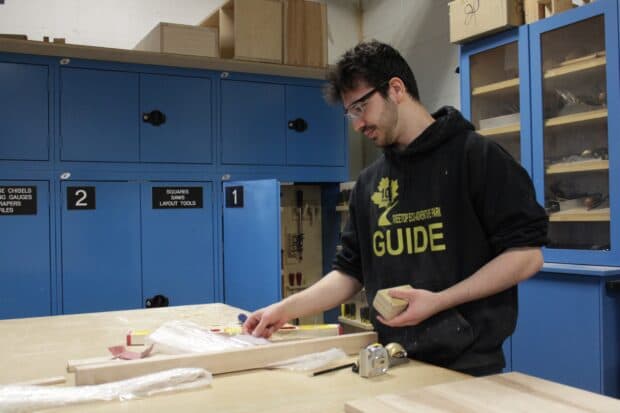The province’s announcement in late March that it will invest $224 million in skilled-trade education to build and upgrade facilities and $75 million for programming and operations, is for private training centres only.
Public colleges, Algonquin College included, will not receive any part of these funds.
“Today, we’re supporting employers, unions and other training providers so that they can build and improve the facilities we need to attract and prepare our next generation of skilled trades workers for better jobs and bigger paycheques for themselves and their families,” said Monte McNaughton, minister of labour, immigration, training and skills development in a news release on March 21.
Claude Brulé, Algonquin College president and CEO, expressed his disappointment about the government’s decision in a release the following day.
“Algonquin College prides itself on providing the best opportunities to prepare students for careers in the skilled trades,” said Brulé. “It is surprising and unfortunate that the college sector was excluded from this announcement, given the major role we play in providing the talent pipeline to the skilled trades sector.”
These funds are part of Ontario’s plan to help the growing shortage of qualified workers in the trade sector. Current estimates from the province say nearly 300,000 jobs are needed in key sectors including technology, health care and in the skilled trades.
With the high number of jobs needed, Ontario’s private and public colleges will be essential to help fill these roles with trained graduates ready to go into their various fields.
Some students at Algonquin have thoughts about the news that Algonquin College was left out of this funding.
Will Mowat, a first-year student in the cabinetmaking and furniture technician program, said though they currently have enough equipment, funding from the province would have been nice.
“I think it’s kind of a bummer. I think it could help students a lot more, maybe like add more equipment,” Mowat said. “Honestly, we could always upgrade more.”
Tom Duda is a student in the carpentry apprenticeship program and said he hasn’t been paying attention to the funding coming from the government, but from his perspective, the college has been doing well on its own.
“It’s my first time going through the trades and (the college) has been pretty solid,” said Duda. “If anything, it should be a balance thing. It seems like they’ve got a solid intake of students all the time here. Whether or not the funding is not getting here is hard for me to say, from what I see, the school seems to be running.”
Destini Broom is a small business entrepreneur in the cabinetmaking and furniture technician program. She has plans to make and sell holistic chairs called perineum steam seats for people menstruating and said she chose Algonquin after she was unable to get her own funding in Québec.
“I’m building perineum steam seats and I realized I didn’t have the skill set I wanted to have the quality of them,” Broom said. “I’ve been in the holistic health field for a long time and wanted to help menstruators have healthy menstrual systems. That’s why I’m here, which is absolutely very different from why most other people (came here).”
Broom is excited about the future of her business as she now officially has prototypes out.

Regardless of the provincial funding news, planned improvements to assist students in the trades are underway.
Chris Hahn, dean of the Perth campus, says the current plans are for improvements specifically to meet the growing need of the programs relying on skilled trades, industry professionals, technicians and technologists.
“By the fall term, we will be opening a new Electronics Lab, a new Basic Wiring Lab and a new Computer Aided Design Lab,” said Hahn in an email. “These new labs will repurpose existing spaces so that we can provide expanding training within existing programs as well as make room for new program development.”
The changes and expansion will touch program areas such as electrical, architecture, carpentry, building science and building automation. He says there will also be opportunities to offer courses on a part-time basis to professionals in the industry.
Hahn adds the benefits of improving these spaces also help with the program timetable as more options will be available.
“Moving forward we have long-held plans to do more with our space such as closing in the north end of ACCE and adding second-floor spaces over existing labs to create even more classes and labs to continue to address the booming construction sector in Ottawa,” Hahn said.
Brulé is urging the provincial government to continue to work with public colleges to provide jobs to bolster the economy and help find people careers.
“Algonquin College, and other colleges in Ontario, already offer the highest quality training and provide our learners the technical expertise and the skills critical to these industries,” said Brulé.


